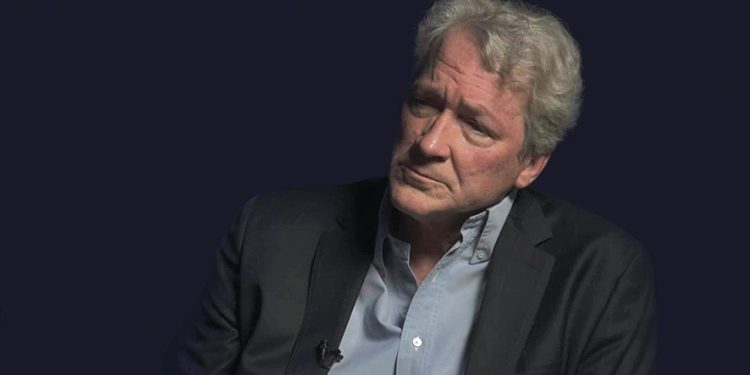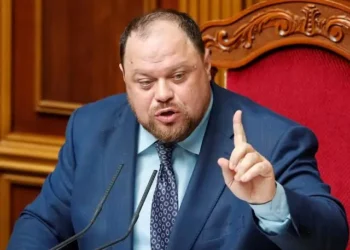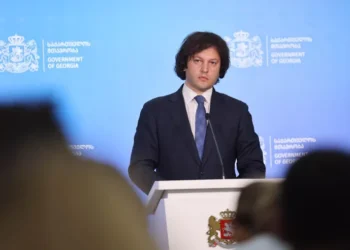Ted Jonas is an international business and environmental defense lawyer, a dual US-Georgian citizen, who has lived and worked in Tbilisi for nearly 30 years. He was responsible for the opening of the National Democratic Institute in 1994 and worked very closely with Zhvania and Saakashvili in engaging with the Shevardnadze government that was in power at the time, as well as with characters like Jaba Ioseliani and Kitovani, who were also part of the political scene. In 1996, with Georgian partners, he founded Dentons law firm.
“Even as somebody who’s worked in business for a very long time, serving as a member of corporate boards, such as Silknet and the Anaklia port, I’ve nonetheless continued to try to participate in public policy and law debates and environmental protection,” he tells Radio Free Europe’s Georgian Service.
RFE spoke to him about “foreign agents law” proposed by the government’s ruling team.
What danger does this law pose? Why should we be concerned?
First of all, the law is overbroad, catching up any person or organization that receives funding from a foreign source. This includes organizations that help the environment, organizations that do academic work, organizations that do scientific work, organizations that support religion, so it’s an infringement on freedom of speech, it’s an infringement on freedom of religion, it’s an infringement on freedom of association, that is how it would be seen.
The biggest danger is the context in which the law was adopted. The sponsors of the law, such as Mr. Kobakhidze, have made it very clear that this law is directed at the funding that Georgian nonprofits, including, for example, the Caucasus Nature Fund, receive from the European Union, from the German government or the French government or the British government or the US government. The law is anti-Western. They never talk about the Russian funding of political parties, Russian funding of media, Russian funding of organizations. In contrast, the US law they mentioned (FARA) was adopted in 1938, and was directed against enemies of the US, which was mainly Soviet Russia and Nazi Germany. Those were the targets, and what the Georgian Government is saying when they compare their bill to the US law is “we consider the EU, the US to be equivalent to Nazi Germany and the Soviet Union.” In the prosecutions brought by the US Justice Department in the last 15 years under that law, seven of the 14 cases are against Russia, two of the cases are against China, and one was against Saddam Hussein’s Iraq. They were selected prosecutions against either enemies of the United States or companies in some gray area, but illegally involved in politics.
The US and EU are Georgia’s allies. America gives a lot of money every year to the Georgian police, to the Georgian Military. We, the United States, support all aspects of Georgian society. Are we an enemy?
In support of the law, Georgian Dream says that “it’s in the name of transparency.”
My understanding is that NGOs, to comply with the tax laws, and to comply with various financial reporting requirements, already have to report their sources of income under Georgia law. The US FARA law has nothing to do with sources of income: It’s about whether the receiving entity in the US is controlled or directed by a foreign party.
You’ve witnessed the growth of Georgian democracy over the years. How significant were the recent events for Georgian democracy?
Very important, and I believe it has a lot to do with why the government changed their position that day. The demonstrations were full of fury. Georgians came out to the streets in big numbers to say, “This is a direct threat to the Western course of this country and you will not get away with it!”
It’s not surprising that there was some vandalism, because people are furious, just like in Ukraine and 2014. The Ukrainians said: “You shall not take us from our European path.” The Georgian people said, “You shall not take us from our European path!” I think it was profoundly important, as important as some past demonstrations that had a major effect on governments, such as, for example, the demonstrations in 2007 against Saakashvili and his government, which led to his resignation, and which is an example that this government should remember well.
Is the Maidan comparison justified? And should we expect events of a similar magnitude?
The reason the government backed down is exactly because they recognize the Maidan comparison. Yanukovich didn’t back down; he was caught between Vladimir Putin on one side who had a gun to his head, and his own people who were going to force him out of office. He didn’t back down, he went to Vladimir Putin.
This government backed down because they recognized that this was an existential threat that wasn’t going to go away. Now, that doesn’t mean that I entirely trust their retraction, because their conduct leading up to this moment has been egregiously bad- they lied to the public in a major way, completely at the direction of Russia and in order to satisfy Russian interests. That doesn’t go away in 24 hours simply because they’ve changed their position. The Georgian people have to be very vigilant about what is happening here.
Who advocated for this law?
When all your friends and partners, at least on paper, tell you you shouldn’t do it, and you go and do it anyway, that means you disrespect those so-called friends and partners. One of the things that has irritated people so much, including me, is the complete disrespect this government has shown to European countries, to the EU and US. Now, if we didn’t support Georgia, if all we did was terrorize Georgia and bother Georgia, well, that would make sense. But we support Georgia, we finance Georgia, we have helped Georgia maintain its independence for 30 years, and to show this kind of disrespect to us, and to show that kind of aggression, means that they view us as their enemy. I was shocked and outraged by this. No Georgian government, and I go back to 1994 here, would ever have disrespected the EU and US in this way. Whose rhetoric were they using? If you ask me, it was very similar to Russian rhetoric, and to the right-wing populist rhetoric of Eastern Europe.

If they see the West as an enemy, who do they see as friends?
Primarily Russia. Georgia is a small nation, as our audience well knows, surrounded by big countries. Every small nation in history has struggled to maintain its sovereignty and independence from large nations that surround it. Georgia was able to preserve its independence and sovereignty only in the High Middle Ages. But, in general, through most of Georgian history, they have had to either accommodate Iran, Turkey or Russia. And the situation is true today – if Georgia does not have a strong relationship with the United States and the European Union, it’s going to have a strong relationship with the other big power that influences this region, which is Russia. You could also list China, Iran, or Turkey, but Russia is still the major heavyweight in the region, despite how much it’s been weakened by the war in Ukraine. And even China, Iran and Turkey will defer to Russia’s historical interest in this region.
Peskov said Russia had nothing to do with the foreign agent law.
I don’t think that Peskov is someone I would believe. As spokesman, it’s his job to lie and spin information.
What goes on inside the Georgian Dream party and leadership is a black box, we can’t see into it, there is no transparency there. We know that the unelected official Bidzina Ivanishvili has a major influence on Georgian Dream. There have for years been these hanging questions: Does Mr. Ivanishvili directly follow instructions from Russia, or does he act in his own interests in a way that may coincide with Russian interests? I personally believe it’s a combination of both. I think the escalation of the Georgian government’s anti-Western actions after the Russian invasion of Ukraine had to have been at least partly a message from the Russians that “we are in a fight in Ukraine, we are in a dire situation in Ukraine, and you damn well better stay loyal and stay on our side, because we’re very nervous about any other threats.”
Russians have been desperately seeking allies. That’s why Lavrov is going all over Africa to find any dictator, even one in a small country, that might support him. I believe the relationship between Ivanishvili, Georgian Dream, and the Russians, on the other hand is a bit of their own interests and on the other a bit of the Russians’ interests. And it is entirely conceivable that Ivanishvili, or somebody within the Georgian Dream apparatus, actually has a conversation with the Russians in this situation, says, “Look, guys, we could get overthrown. Because of this situation, we are in a desperate and dangerous situation. You need to give us a break. You have to give us a little bit of room to accommodate this domestic opposition. We tried in good faith, look at how much sacrifice we made to try to push this agenda. But it got very dangerous.” And maybe they said, “Unless you want to see another Maidan in Georgia, you need to give us some space to back off.”
I can see that kind of thing. In my opinion, Mr. Ivanishvili prefers a Georgia where he is not subject to European-type laws and regulations. I think that this has a lot to do with his own interests, as well as Russia’s. I don’t think it’s a pure diktat relationship, I think there’s some dialogue and give and take in it. But the bottom line is still the same, which is that Russia wants Georgia in their camp. As everyone can see, in the last year, the government has been anti-Ukraine, anti-Western; they’ve acted in Russia’s camp, and that has not suddenly changed because they withdrew this law.
The reason the government withdrew it was the people in the streets and not Brussels being “very concerned” and “condemning it in the strongest terms.” Will the Georgian Dream now be allowed back into the good graces of Monsieur Michel and co.?
I think the EU and US representatives will take a more moderate and conciliatory tone because their objective is to maintain the relationship with Georgia. It is their job as diplomats to deal with the government that is in power. Other actors from the EU, the outspoken MEPs like my friend Viola von Cramon, or outspoken figures in the US like Senator Jeanne Shaheen, or retired General Ben Hodges, I think people like that will continue to be far more skeptical and critical.
Could the case be made that this conciliatory tone helped encourage the government’s actions?
A little. But the criticism from the West is not what affected their conduct. What affected their conduct was what happened in the street. And the fear that the Georgian public was really going to finally, in majority, actively turn against them, and toss them out. A Maidan scenario.
And if the Western response had been stronger?
Like sanctions? Sanctions are a legal act that has to be legally grounded. And as much as it may be emotionally satisfying to see sanctions against Bidzina Ivanishvili and sanctions against certain figures in the government, the basic issue there is that the legal groundwork has not been established. You have to meet certain specific criteria to impose sanctions. There has to be proof that Ivanishvili really is carrying out instructions for the Russian government, or that there are sanction evasions by Georgia. There’s certainly the impression floating in the air that that’s exactly what’s happening. But unless there is solid evidence of it, it can’t be done. It’s a judgment call by lawyers in the US Treasury Department and in the United Nations and EU. It’s a legal judgment, and it needs the legal groundwork and proof to be established in order to institute sanctions.
So that is the only thing stopping them? They can’t find the legal proof?
My personal opinion is yes. I can’t speak for the US government; I can only speculate about it. But if the legal evidence was there for sanctions against Mr. Ivanishvili, meaning proof of a direct connection to Russia, I think the West would be glad to impose those sanctions, because it’s clear that they are not happy with this government. The government is insulting them on a daily basis; is aggressive towards them on a daily basis. This government is not on board with US foreign policy, it is not on board with EU foreign policy- it’s on board with Russian foreign policy, and Russia is an adversary of the United States.
How much credibility and trust does the Georgian government have left in the eyes of the West?
The Georgian Dream government had a lot of credibility with the Western governments at the end of 2020, because the elections, from their point of view, were relatively ok, and the opposition looked bad for refusing to enter Parliament. And then, all of a sudden, for some reason, in 2021, GD starts engaging in conduct that gratuitously, unnecessarily sought to provoke and alienate the country’s Western interests.
I believe they have lost trust in this government and it mainly happened in the last year, after the Ukraine invasion, because the rhetoric of the government got so anti-western. The West, didn’t start that fight, they did. I think these people – Mr. Kobakhidze and others, I used to think: Oh my god, how can they be so stupid? But they are not stupid. They know what they’re doing.
And where does that path lead?
It can only lead into Russia’s orbit. Because again: small nation, difficult neighborhood surrounded by big powers. Georgia doesn’t have David Agmashenebeli or Queen Tamar, and we don’t have the Seljuks in retreat. We live in a world today, where Georgia, like many other small nations in difficult areas, needs outside help and support. And if it’s not getting that from the West, it’s going to get it from Russia. So if you are not here with the West – and everybody knows it, Shevardnadze knew it, Zurab Zhvania knew it, Misha Saakashvili knew it, and Gamsakhurdia knew it, from what I understand – if you’re not with the West, then you are going to be falling over to the Russian side.
Interview by Vazha Tavberidze for RFE/RL














